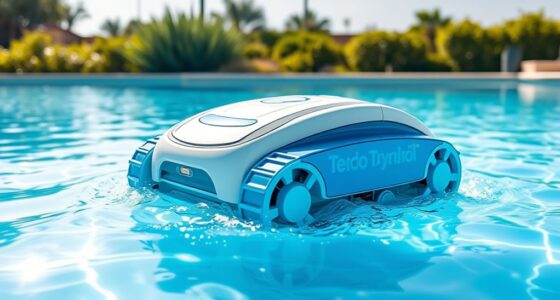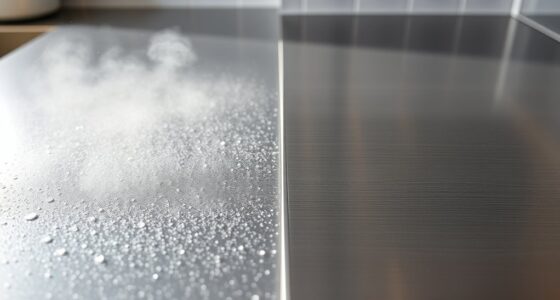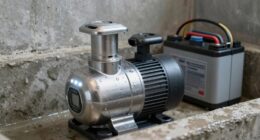Pressure pool cleaners are still relevant today, especially for large, in-ground pools. They use water pressure from your pool’s pump to circulate and remove debris efficiently. While robotic cleaners offer advanced, hands-free cleaning, pressure models can be a cost-effective option for routine maintenance. However, they may need more manual setup and struggle with complex shapes. Explore further to discover how these tools compare and which might suit your pool best.
Key Takeaways
- They effectively clean large, in-ground pools using high-pressure water jets, especially in areas with simple shapes.
- Pressure cleaners are generally more affordable upfront but may incur higher long-term energy and maintenance costs.
- They require manual setup and hose adjustments, making them less convenient than automated robotic options.
- Limited in detailed cleaning and maneuverability around complex pool features compared to modern robotic cleaners.
- They remain relevant for specific scenarios, such as larger pools or users seeking budget-friendly, straightforward cleaning solutions.
How Pressure Pool Cleaners Work

Pressure pool cleaners operate by using high-pressure water jets to move and clean the pool’s surfaces. As they propel themselves around, they scrub away dirt and debris effectively. To do this efficiently, you need to maintain proper pool chemistry, ensuring the water balance supports ideal cleaning and prevents algae buildup. Proper water chemistry helps keep the water clear and reduces the risk of clogging the cleaner’s jets. Additionally, cover maintenance plays a role, as a clean, well-maintained cover reduces debris entering the pool, easing the workload of your pressure cleaner. These systems typically connect to your pool’s existing filtration setup, directing water through jets that generate the force needed for movement and cleaning. Regularly checking water pressure and ensuring the cleaner’s parts are in good condition will keep it functioning smoothly, maintaining your pool’s cleanliness with minimal effort. Proper equipment maintenance also helps extend the lifespan and efficiency of your pressure pool cleaner. Maintaining proper pool chemistry ensures the water remains balanced, which can prevent the buildup of algae and other contaminants that could hinder cleaning performance. Understanding pressure system operation can help optimize cleaning efficiency and troubleshoot issues when they arise. Additionally, being aware of filter system health can further enhance the cleaner’s effectiveness by reducing debris load.
Benefits of Using Pressure Pool Cleaners

Pressure pool cleaners make it easy to remove debris quickly and thoroughly. They save you time by automating the cleaning process, so you don’t have to do it manually. With these benefits, maintaining a clean pool becomes simpler and more efficient. Additionally, high efficiency ensures thorough cleaning while conserving energy. As automation becomes more prevalent in various industries, these cleaners exemplify how technology-driven solutions can enhance everyday tasks. Understanding regulatory oversight can also help ensure these devices meet safety standards and perform reliably. Incorporating performance upgrades can further optimize their cleaning capabilities and extend their lifespan. Being aware of regional resources and tools can also aid in selecting the best equipment suited to your specific needs.
Effective Debris Removal
Because they generate powerful jets of water, pressure pool cleaners excel at removing debris from your pool’s surfaces. They handle dirt, leaves, and other particles efficiently, reducing your need for manual scrubbing. Unlike manual scrubbing, which can be time-consuming and labor-intensive, pressure cleaners reach into corners and crevices that are hard to clean by hand. Their thorough debris removal minimizes the amount of organic material floating in your pool, which can help reduce the demand for chemical maintenance. By consistently clearing debris, pressure cleaners also help prevent algae buildup and water discoloration. This ensures clearer, cleaner water with less effort on your part. Additionally, regular use of pressure pool cleaners can contribute to maintaining effective pool sanitation, making your overall maintenance routine more manageable. Properly functioning debris removal tools are essential for keeping your pool in optimal condition, especially during heavy use seasons. Overall, pressure pool cleaners effectively keep your pool surface free of debris, making maintenance simpler and more reliable.
Time-Saving Automation
By automating debris removal, pressure pool cleaners save you significant time and effort during maintenance. Instead of manual operation, you can rely on these devices to cover the entire pool efficiently. This automation not only reduces your workload but also ensures consistent cleaning, which enhances your pool’s aesthetic appeal. Consider these benefits:
- Faster cleaning cycles, freeing up your schedule
- Less manual effort, reducing fatigue and errors
- Improved pool appearance, thanks to regular, thorough maintenance
- Regular use can help detect early signs of issues like skin changes or discoloration, which are symptoms of potential problems such as algae growth or other pool hazards.
Using pressure pool cleaners means you spend less time on manual operation and more time enjoying your pool’s pristine look. Plus, their automation feature helps maintain a beautiful, inviting environment, making your pool the centerpiece of your space.
Limitations and Challenges of Pressure Cleaners
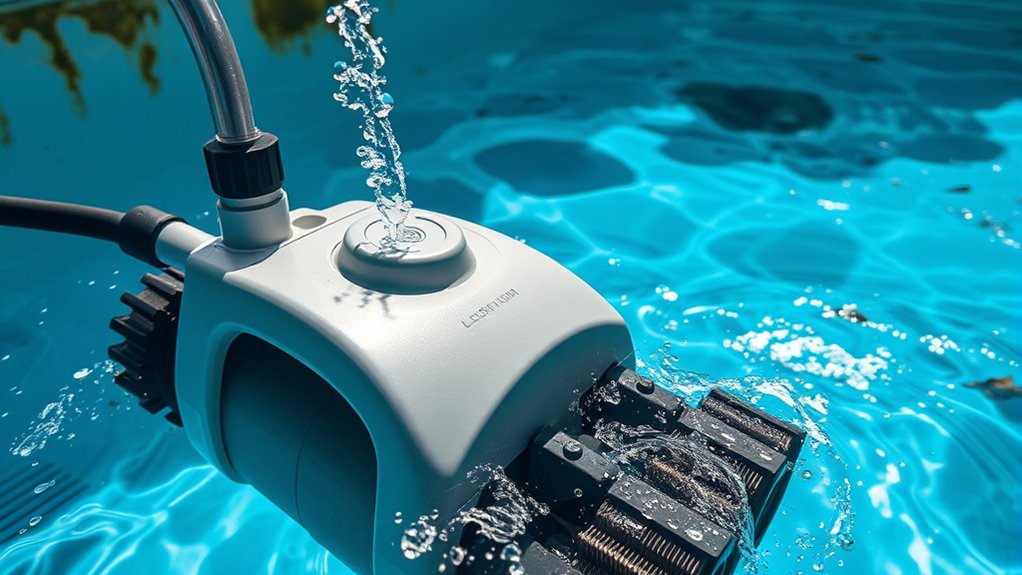
While pressure pool cleaners offer efficient cleaning, they also come with notable limitations. You’ll need to perform manual operation to set them up and maintain their hoses, which can be time-consuming. They aren’t ideal for thorough chemical cleaning, as they primarily rely on water pressure rather than chemical treatment to sanitize your pool. Additionally, their movement can be restricted by complex pool shapes or obstacles, leaving some areas uncleaned. They also require a dedicated booster pump, increasing energy consumption and operational costs. Unlike robotic cleaners, pressure models don’t adapt to different pool conditions automatically. These challenges mean you might still need to supplement cleaning with manual scrubbing or chemical treatments to keep your pool pristine. Furthermore, the limited versatility of pressure cleaners makes them less suitable for diverse pool types, which could impact their overall effectiveness. Incorporating advanced cybersecurity measures in pool equipment can help prevent hacking and unauthorized control of cleaning systems. To maximize efficiency, it’s essential to understand the limitations of pressure cleaners and consider alternative solutions for comprehensive pool maintenance.
Comparing Pressure Cleaners With Robotic Devices
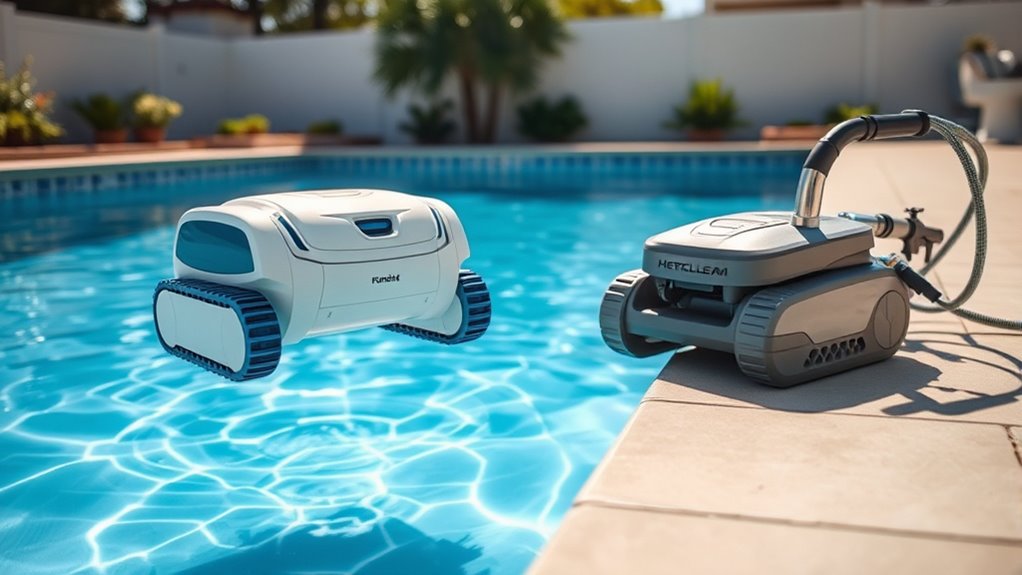
Robotic pool cleaners have become a popular alternative to pressure models due to their advanced automation and efficiency. Unlike pressure cleaners, they require minimal manual operation and considerably reduce user intervention. Consider these key differences:
Robotic pool cleaners offer hands-free operation with superior cleaning efficiency.
- Automation: Robotic cleaners operate independently, steering your pool without constant guidance, freeing you from manual effort. Their automated navigation systems ensure comprehensive coverage of the pool surface, often utilizing sensors to detect dirt and obstacles effectively. Their programmed routes enhance cleaning precision while conserving energy.
- Efficiency: They clean more thoroughly and consistently, targeting dirt and debris with precision. Their design often incorporates advanced sensors that help detect and adapt to different pool conditions.
- User Intervention: Pressure cleaners often need manual operation and regular adjustments, while robotic models are designed for hands-off use.
- Decor and Environment: Their sleek designs can also complement a calming decor aesthetic, creating a more serene outdoor space.
If you prefer a set-it-and-forget-it approach, robotic devices clearly outshine pressure cleaners by reducing your involvement and improving cleaning results.
Cost-Effectiveness and Maintenance Considerations

Robotic pool cleaners often prove more cost-effective over time due to their lower maintenance requirements and energy consumption. When considering cost comparison, robotic models typically have fewer moving parts and are easier to maintain, reducing ongoing maintenance costs. Maintenance simplicity can significantly lower the overall expenses associated with pool cleaning equipment. Additionally, robotic cleaners operate more efficiently, using less energy and saving you money on electricity bills. While pressure cleaners can be cost-effective upfront, their higher maintenance costs can offset the initial savings. Furthermore, the technological advancements in robotic pool cleaners have improved their effectiveness and durability, making them a more reliable choice. The energy efficiency of robotic models contributes to lower operational costs, further enhancing their value. Overall, if you factor in maintenance and energy expenses, robotic pool cleaners tend to offer better long-term value, making them a smarter investment for consistent pool cleaning. Family dynamics and the influence of personal relationships can also indirectly affect decisions about home maintenance and upgrades.
Suitability for Different Pool Types and Sizes

Choosing the right pool cleaner depends heavily on your pool’s size and type. Pressure cleaners work well for larger pools but may not suit small or irregular-shaped ones. Consider these factors:
- For large, in-ground pools, pressure cleaners cover more area efficiently, reducing manual operation.
- In smaller or above-ground pools, manual cleaning might be more practical, especially for spot cleaning and chemical maintenance.
- Chemical cleaning remains essential regardless of the cleaner, as pressure models mainly handle debris, not algae or bacteria buildup.
While pressure cleaners excel at removing debris, they’re less effective for detailed cleaning or chemical treatment. Assess your pool’s size and shape before choosing, ensuring the cleaner aligns with your maintenance routine and pool type.
Technological Advancements in Pool Cleaning Tools
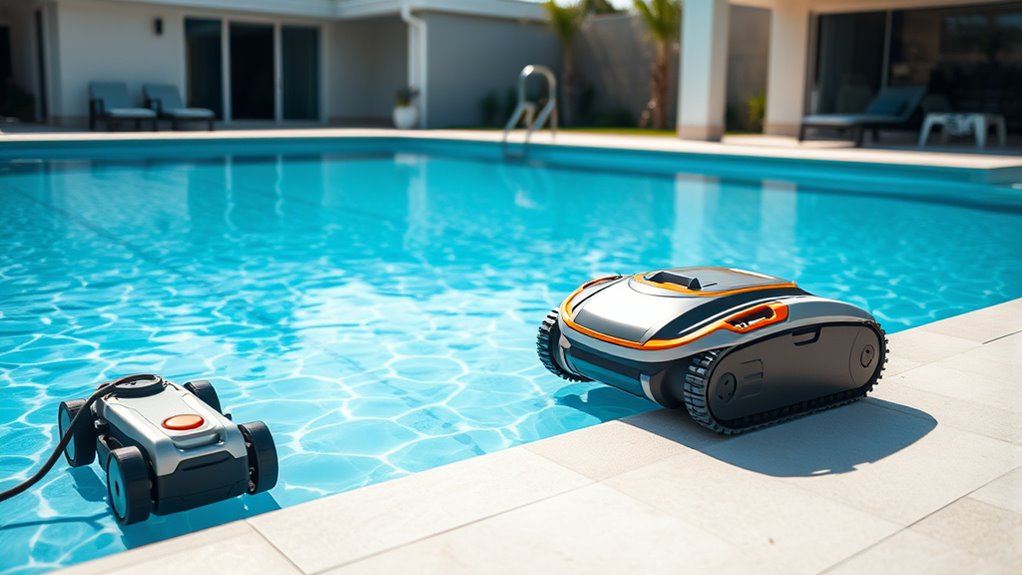
Recent technological advancements have markedly transformed pool cleaning tools, making maintenance more efficient and effective than ever before. Modern tools now minimize manual operation, reducing the time and effort you spend on cleaning. Automated robotic cleaners, for example, use sensors to navigate pools, scrubbing and vacuuming debris without your constant input. These innovations also improve chemical treatment by ensuring cleaner water, which reduces the need for excessive chemicals. Some systems even integrate smart technology, allowing you to control and monitor cleaning remotely. These advancements mean you no longer rely solely on pressure pool cleaners or manual methods; instead, you benefit from more precise, thorough cleaning with less effort. As a result, maintaining a sparkling pool has become faster, easier, and more reliable.
The Future of Pool Cleaning Technologies
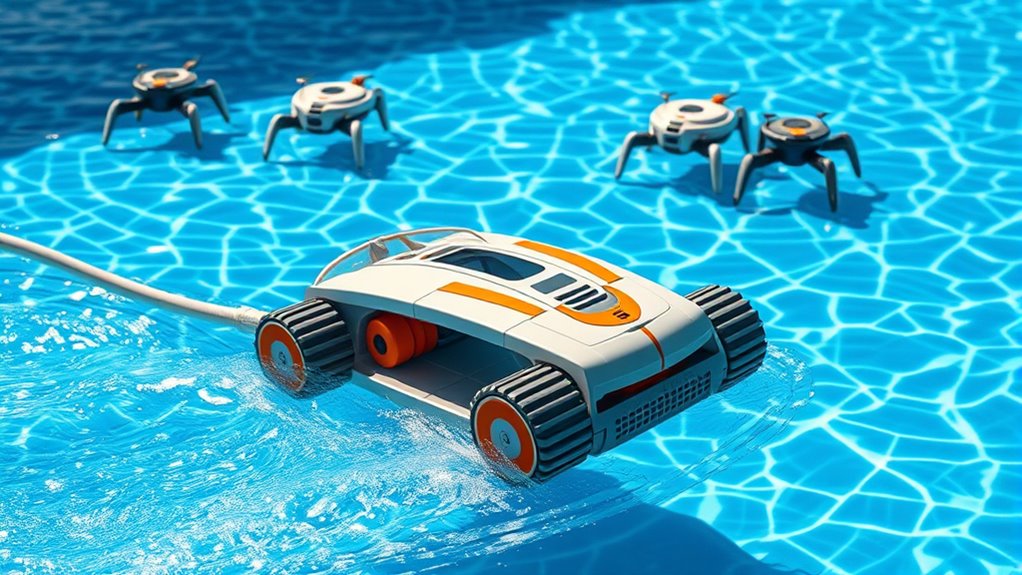
The future of pool cleaning technology is set to transform how you maintain your pool, with smarter automation making the process easier. Eco-friendly solutions are becoming more common, helping you clean efficiently while reducing environmental impact. Integration with smart home systems will allow you to control and monitor your pool cleaning remotely, ensuring convenience and precision.
Automation Advancements Impact
Automation advancements are revolutionizing how pool cleaning systems operate, making them more efficient and user-friendly. You’ll see a shift away from manual operation, as smart systems handle tasks with minimal input. This progress impacts chemical cleaning by optimizing chemical distribution, reducing waste, and maintaining better water quality. As automation evolves, consider these key points:
- Increased independence from manual operation, saving you time and effort.
- Precise control over chemical cleaning, ensuring safer and more effective results.
- Integration of sensors and AI that adapt to pool conditions, enhancing overall cleanliness.
These innovations mean you won’t need to rely solely on traditional methods. Automation makes pool maintenance more consistent, freeing you from constant oversight and improving your pool’s health.
Eco-Friendly Cleaning Solutions
As automation advances make pool cleaning more efficient and precise, many homeowners are also seeking eco-friendly solutions that reduce environmental impact. You can opt for biodegradable chemicals that break down naturally, minimizing harmful runoff into your yard and local water sources. These safer alternatives help keep your pool clean without relying on harsh, synthetic chemicals. Additionally, some pool owners incorporate manual scrubbing into their routine, reducing the need for energy-intensive equipment and chemicals. This hands-on approach allows you to target specific areas, ensuring thorough cleaning while lowering your ecological footprint. Embracing these eco-friendly practices not only benefits the environment but also promotes safer, healthier swimming conditions for you and your family. Eco-conscious pool maintenance is becoming a smart, sustainable choice for the future.
Integration With Smart Tech
Integrating smart technology into pool cleaning systems is transforming how homeowners maintain their pools. With app integration and smart home compatibility, you can control your cleaner from anywhere, schedule cleanings, and monitor performance. This tech evolution offers benefits like:
- Increased convenience—manage your pool remotely.
- Enhanced efficiency—program precision cleaning routines.
- Improved maintenance—receive real-time alerts for issues.
Smart home integration makes your pool cleaner part of your connected environment, enabling seamless automation. You no longer need to manually start or stop devices; instead, your system adapts to your lifestyle. As technology advances, pressure pool cleaners will become smarter and more intuitive, ensuring your pool stays pristine with less effort on your part. This integration signifies the future of pool maintenance, blending traditional cleaning power with cutting-edge innovation.
Frequently Asked Questions
How Energy-Efficient Are Pressure Pool Cleaners Compared to Other Types?
Pressure pool cleaners are generally energy-efficient, especially compared to robotic models. They often use less power because they rely on your pool’s existing pump, which can be solar powered, reducing electricity costs. Unlike manual operation, these cleaners work automatically, saving you time. While they consume some energy, their efficiency makes them a practical choice for maintaining clean pools without high energy bills.
Can Pressure Pool Cleaners Handle Debris Like Leaves and Twigs Effectively?
You want a cleaner that handles debris like leaves and twigs effectively. Pressure pool cleaners excel at leaf removal and twig collection, making them a reliable choice. They spray water forcefully to dislodge stubborn debris, ensuring thorough cleaning. If you need quick, efficient debris removal, pressure cleaners are your best bet. They tackle large debris with ease, leaving your pool spotless, so you can enjoy a pristine swimming environment.
Are Pressure Pool Cleaners Suitable for Saltwater Pools?
You can definitely use pressure pool cleaners in saltwater pools, but you should consider salt compatibility and corrosion concerns. Make sure the cleaner’s parts are resistant to salt, as prolonged exposure can cause corrosion. Regular maintenance and choosing models designed for saltwater help prevent damage. Overall, with proper care, pressure cleaners are effective and suitable for saltwater pools, keeping your pool clean without worries about corrosion issues.
How Long Do Pressure Pool Cleaners Typically Last Before Replacement?
Think of your pressure pool cleaner as a loyal workhorse—it can last several seasons with proper maintenance. Typically, you’ll get 3 to 5 years before it needs replacing, depending on usage and water conditions. Regular maintenance schedules help extend its life, while cost considerations should factor into your decision. Keep it clean, check for wear, and you’ll enjoy efficient cleaning without frequent replacements.
Do Pressure Pool Cleaners Require Professional Installation or Setup?
Pressure pool cleaners generally don’t require professional setup; you can easily handle DIY installation with clear instructions. Most models come with user-friendly guides, making it simple for you to connect hoses and position the cleaner. However, if your pool is complex or you prefer a hassle-free experience, opting for professional setup ensures everything is correctly installed and maximized for peak cleaning performance.
Conclusion
While pressure pool cleaners still effectively clean large debris and stubborn dirt, robotic devices now handle intricate corners and delicate surfaces with ease. You might appreciate the reliability of traditional pressure cleaners, but modern technology offers smarter, more autonomous solutions. Ultimately, whether you stick with pressure cleaners or switch to robotics depends on your pool’s size, shape, and your cleaning priorities. Embrace the evolution—your pool’s cleanliness is worth the upgrade.


